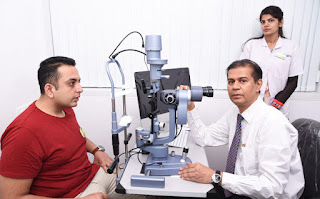Laser Photocoagulation In Diabetic Retinopathy
Introduction
Diabetic retinopathy is a serious condition that may lead to blindness. If you are diabetic, you should have a routine eye examination. If you feel any changes in your vision, consult with an ophthalmologist. Get retina treatment in Mumbai from the best ophthalmologist.
What Is Diabetic Retinopathy?
People with diabetes are at increased risk of developing retinal diseases. The retinal disease caused because of diabetes is known as diabetic retinopathy. Approximately 2 in every 5 diabetic patients suffer for mild to severe form of diabetic retinopathy. Diabetic retinopathy may be caused due to both type 1 and type 2 diabetes. Diabetic retinopathy may affect both children and adults. Women with gestational diabetes are at increased risk of developing this condition.
It is also to be noted that diabetic retinopathy may lead to permanent vision loss. Thus, the only way to preserve the vision is to consult with the ophthalmologists as soon as the symptoms of retinopathy or any change in vision occur. The ophthalmologists are experts enough to prevent the progression of the disease and thus able to avoid blindness.
Out of various options available for the treatment of diabetic retinopathy, photocoagulation therapy is effective in managing the condition even when it progresses into a later stage.
How Laser Photocoagulation Helpful In Diabetic Retinopathy?
The retina is situated at the back of the eye. It is supplied by various tiny blood vessels. In diabetes, these tiny blood vessels swell and bleed. This results in a reduced supply of blood to the retina. The scar gets formed on the retina. In cases where the immediate treatment is not provided, the retina may detach. A detachment of retina affects the vision. Angiogenesis may also occur in the retina.
To prevent the leakage of blood vessels and to destroy the new blood vessels, the ophthalmologist may recommend photocoagulation. In mild to moderate cases, where there is only the leakage, the doctor may advise focal photocoagulation. This process involves the use of a laser. The laser is concentrated on a small section of blood vessels. The heat generated through laser seals the blood vessels. This prevents the leakage of blood.
In more advanced cases, where there is a growth of new blood vessels, scatter photocoagulation is used. This process burns the new blood vessels. Depending upon the extent of disease, the burning through laser may cause vision loss to some extent. Photocoagulation prevents macular edema, blindness and a detached retina in the patients suffering from diabetic retinopathy.
The procedure takes approximately one hour. The pupil is dilated and anesthetic is administered in the eye. Although there are some flashes of light seen during the procedure most patients do not feel pain. You are advised to wear dark glasses. The soreness in eyes will remain for a few days and goes away as eyes heal.
What Are The Symptoms Of Diabetic Retinopathy?
Following are the symptoms of diabetic retinopathy:
- Blurry vision
- Floaters
- Reduced ability to see colors.
- Unable to read and drive properly
- Holes in the vision
- Seeing cobwebs
How To Manage Diabetes?
To reduce the risk of diabetic complications, you should manage your diabetes. This can be done through the following measures:
- Staying hydrated
- Quit smoking
- Drinking enough water
- Reduce weight
- Healthy diet
- Enough quantity of vitamins and minerals
- Reduced intake of sugar and processed food.

Comments
Post a Comment